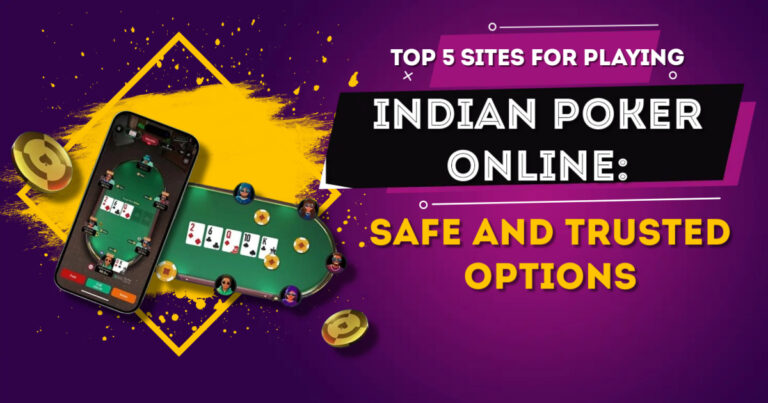The Business of Poker in India: Market Size and Potential
Over the past decade, India has witnessed a remarkable transformation in how poker in India is perceived. Once considered a fringe activity with connotations of gambling, poker is now gaining mainstream acceptance as a skill-based game, particularly among young, tech-savvy Indians. As regulatory frameworks evolve and digital adoption deepens, the business of poker in India and the Best Rummy games is undergoing a significant boom. This article explores the market size, key drivers, investment landscape, and the immense potential the Indian poker industry holds in the years ahead.

A Growing Market: The Numbers Behind Poker in India
India is home to over 1.4 billion people, with over 800 million internet users and around 650 million smartphone users as of 2025. The country’s expanding digital infrastructure is laying the perfect groundwork for online gaming, and poker is riding this wave.
While official market size figures vary, estimates place the Indian online poker industry at around ₹2,000 crores ($250 million) in 2024, with a projected CAGR (Compound Annual Growth Rate) of 20–25% over the next five years. This puts poker in a strong position to cross ₹5,000 crores ($600 million) by the end of the decade. Though smaller than fantasy sports and rummy, poker’s niche appeal among the affluent and aspirational class, along with games like Teen Patti Stars, gives it a unique edge.
The Online Poker Boom
The advent of real-money gaming platforms like Adda52, PokerBaazi, Spartan Poker, and MPL Poker has revolutionized the way Indians engage with poker. These platforms offer cash games, poker tournaments, and freerolls that attract both casual players and professionals. With low entry barriers, ease of access through mobile apps, and real cash rewards, online poker in India has become a thriving industry.
Key factors driving the online poker surge include:
- Increased smartphone penetration: Affordable smartphones and data plans have democratized access.
- Pandemic-induced digital shift: COVID-19 lockdowns forced many people to explore new forms of entertainment from home, causing a temporary—but significant—spike in poker traffic.
- Gamification and UI/UX improvements: Platforms are investing heavily in user experience, including leaderboards, bonuses, avatars, and loyalty programs to retain players.
- Influencer marketing and celebrity endorsements: The involvement of Bollywood actors and cricketers as brand ambassadors has helped normalize poker and boost its appeal.
Demographics of Indian Poker Players
The core audience for poker in India consists of:
- Age group: Predominantly 21–35 years old.
- Professionals: IT workers, finance professionals, students, and entrepreneurs who enjoy strategic and mental challenges.
- Metro cities: Delhi, Mumbai, Bangalore, Pune, and Hyderabad are major poker hubs, though Tier 2 cities are catching up rapidly.
This demographic is financially literate, digitally active, and open to new forms of entertainment like poker in India that also offer the potential for monetary gain. The perception of poker as a “mind sport” is gaining traction, especially with India’s growing interest in chess and e-sports.
Legal Landscape: Challenges and Opportunities
Poker in India, including the growing presence of female poker players, exists in a complex legal landscape. The game is recognized as a game of skill in several states, including West Bengal, Karnataka, Nagaland, and Sikkim, but banned in others such as Gujarat and Telangana. The Public Gambling Act of 1867, a colonial-era law, still governs gambling in most parts of the country, leaving much open to judicial interpretation.
However, recent court judgments have begun to distinguish between skill and chance, with poker leaning toward the former. Nagaland’s Prohibition of Gambling and Promotion and Regulation of Online Games of Skill Act, 2016, was the first to issue licenses to poker operators, setting a regulatory precedent.
There’s a growing call for central regulation to replace the fragmented state-by-state approach, especially since the gaming industry now contributes significantly to employment and tax revenues.
Investment and Business Potential
Investors are beginning to see poker not just as a game, but as a platform with high ROI.Several Indian poker platforms involved in poker in India have secured funding rounds from both domestic and international investors. Key growth areas attracting investment include:
- Technology development: AI-powered opponent matching, secure payment systems, anti-collusion algorithms.
- Marketing and branding: Expansion into Tier 2 and Tier 3 cities, regional language support, influencer-driven campaigns.
- Tournament ecosystems: High-stakes online events like the India Online Poker Championship (IOPC) and PokerBaazi Premier League (PPL) are creating seasonal spikes in user engagement.
- Education and training: Startups are emerging to offer poker training and coaching, further professionalizing the field.
With the global poker industry estimated to be worth over $6 billion, India’s growing share in this pie makes it a highly attractive market for venture capital and angel investors.

Live Poker and Casino Tourism
While online poker dominates, live poker is slowly gaining ground too. Legal casinos in Goa, Sikkim, and Daman host live poker tournaments that attract domestic and international tourists. The India Poker Championship (IPC), hosted on luxury cruise liners in Goa, is a prime example of the growing poker tourism sector.
CCasino operators see poker in India as a skill-based crowd-puller and a branding tool. With the rise in high-net-worth individuals (HNIs) and young professionals with disposable income, poker tourism is expected to become a key contributor to hospitality revenues in legal gambling zones.
Challenges to Growth
Despite the positive outlook, the Indian poker industry faces several challenges:
- Regulatory uncertainty: The lack of nationwide policy clarity deters bigger players and creates operational hurdles.
- Perception issues: Poker still carries a stigma in many parts of India, especially in conservative households and media narratives.
- Payment gateway hurdles: Banks and payment processors remain wary of real-money gaming transactions.
- Fraud and responsible gaming: Ensuring fair play, preventing addiction, and maintaining user trust is critical for the sustainable growth of poker in India.
These challenges require coordinated efforts from platforms, regulators, and advocacy groups to ensure a healthy ecosystem.
The Road Ahead
India’s poker market is at an inflection point, highlighting the rapid growth and evolving landscape of poker in India. As more states embrace skill-based gaming and as tech innovations continue to drive engagement, poker is well-positioned to become a major component of India’s online gaming economy.
Key developments to watch in the near future include:
- Unified regulation under a national gaming policy.
- Entry of global poker brands either through partnerships or direct operations.
- Increased representation in e-sports and televised events.
- Mainstream sponsorships and team-based poker leagues.
- Further gamification and integration with crypto/web3 economies.
With its unique combination of strategy, excitement, and community, poker has the potential to not only grow in terms of revenue but also carve out a cultural space similar to fantasy sports or mobile gaming in India.
Conclusion
The business of poker in India is no longer just a niche pursuit—it is a rapidly evolving, technology-driven, and investment-ready sector. With millions of potential players, increasing social acceptance, and expanding digital infrastructure, India stands on the cusp of becoming one of the biggest poker markets in the world. As legal clarity improves and innovation continues, poker’s future in India looks not just profitable but powerful.








